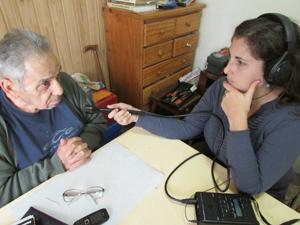One Family’s View of Social Changes in Uruguay
Interviewing Grandfather Alfredo Perrone (Photo: Valeria Fernandez)
Political conversation and music in my old neighborhood in Montevideo – I’ve missed those sounds since I moved to the United States 13 years ago. When I went back for a few weeks in December, I was curious to know what people were thinking about Uruguay’s recent avalanche of legislation, including legalizing marijuana sales and abortion, and soon, same-sex marriage.
I didn’t have to look very far. The members of my family represent the full spectrum of Uruguayan politics – and they love to talk.
My sister Gaby is a 29-year-old high-school music teacher and a trained singer. When I ask her about the legislation legalizing marijuana sales, she tells me that she doesn’t like the fact that people would have to register to buy pot from the government.
But she wouldn’t mind growing her own.
“I’d like to have my own plants because it’s organic,” she says. “I have many seeds that someone gave to me as a gift.”
Smoking “porro,” the South American slang for a joint, isn’t illegal in Uruguay. But growing pot is, and that would change under the legislation. Supporters say nationalizing marijuana sales would take away some of the market for drug traffickers, and it might help bring down the recent spike in drug-related crime.
My father, a doctor, is all too aware of that trend. As we drive through Cerro Norte, a low-income neighborhood where he makes house calls, he points out a pile of sneakers hanging from a power line. He says this place is a hub for sales of highly addictive cocaine paste. Once we got to his office, he tells me he’s afraid drug-related violence is out of control in Uruguay, but he doesn’t think making marijuana legal is the way to go.
“This will only get worse,” he says, “because the drug traffickers will stop smuggling marijuana and will just produce more cocaine paste.”
But one change my father does support is Uruguay’s new abortion law. As a doctor, he’s seen the consequences of banning abortion.
“A woman would do the abortion at home,” he says, “and she would risk dying, out of shame.”
Abortion politics are complex here, just as they are in the US. Take my Aunt Verónica, a biology professor who describes her politics as “left of left.” You might think she’d support legalized abortion, but she doesn’t.
“I believe that life begins when it begins, when it took form, because I’ve been pregnant, I’m a mother.”
While my aunt doesn’t like the abortion law, she does like the man who’s presiding over these changes — former Tupamaro guerrilla turned President Jose Mujica.
He’s known as “Pepe.”
But don’t get my 78-year-old grandfather started on Pepe. My grandpa’s a conservative ex-military man who distrusts anything coming from what he calls “this communist government.”
Still, he’s intrigued by the marijuana law. “Maybe we should applaud this idea,” he says.
It reminds him of what Uruguay did when the US enacted prohibition and banned the sale of alcohol. Uruguay decided to nationalize alcohol production to control the market. My grandfather says perhaps nationalizing marijuana sales would work as well.
“We could control trafficking and take business away from drug traffickers,” he says.
I was surprised by that, and by some of his other views, for instance, on same-sex marriage. He actually supports civil unions, though not gay marriage.
When I was growing up here, people didn’t talk about these issues. Now, there’s a thirst for dialogue, not only among political leaders but inside the homes of families like mine. And the conversations are far from predictable.
